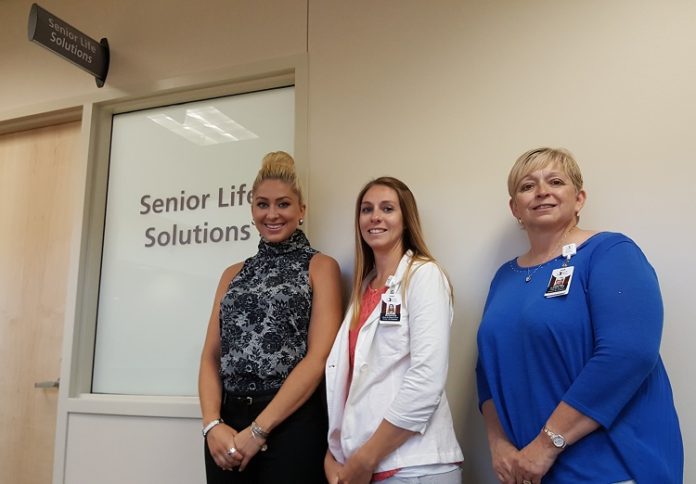
The Dallas County Hospital has begun providing a new service in its recently refurbished second-floor atrium with the opening of Senior Life Solutions, which offers mental health services to adults over the age of 65 who are struggling with age-related depression and anxiety.
The mission of Senior Life Solutions is “to improve the quality of life of older adults living in rural communities” by means of an intensive outpatient group therapy program.
Program Director Karen Hildreth said the Perry office of Senior Life Solutions will have the capacity for about 10 patients. She said the average length of the program is six to nine months, depending on the needs of the individual.
Meredith Stensland, program therapist, described the standard therapy program. Groups meet three times a day on three days a week, which makes nine group-therapy meetings per week. Individual patients then meet one-on-one with Stensland twice monthly and once a month with a psychiatrist from the company’s Kansas City, Mo., offices.
“Patients usually start here, with the 9-2-1 standard package,” Stensland said, “and then they move down as their needs are met.”
Program graduates can continue with monthly meetings of the after-care group, “and you can always restart,” she said.
She said people can benefit from the program if they are experiencing common indicators or triggers or depression, including loss of a spouse or a close family member, loss of interest in previously enjoyed activities, difficulty sleeping or feelings of sadness or grief lasting more than two weeks.
“It’s not just seniors who have difficult talking about this,” Stensland said. “It’s anyone at any age. It’s difficult and painful to bring up these thoughts and feelings. Often people assume that having difficulty with one’s mental health is a sign of weakness and somehow different from having any other medical illness.”
She said people in rural communities can also experience “a stigma placed on seeking behavioral health care. Often people do not know how to access care and what treatment options are available. At Senior Life Solutions, we educate communities and break down that stigma.”
Hildreth said Senior Life Solutions accepts a variety of insurance plans and combinations of coverage.
“We’re here to work with people and see that they get the treatment that’s right for them,” she said. She said family members, physicians or other health professionals can refer individuals to the program.
Hildreth said the Perry office will start seeing its first patients this week and already seems to have found a ready market in the Perry area.
Macinzie McFarland, DCH community relations and marketing manager, agreed the new Senior Life Solutions is getting a lot of attention.
“They are doing great with referrals,” McFarland said.
Demographics are leading providers to brace for a surge of new patients seeking mental health care thanks to the coverage of basic mental health services under the Affordable Care Act or Obamacare. Other numbers also suggest a growing market:
- Approximately 25 percent of primary-care patients have one or more psychiatric disorder.
- 25 percent of U.S. adults experience a mental-health issue in a given year.
- 60 percent of them receive no treatment.
- 68 percent of adults with a mental-health disorder have at least one medical condition.
- 50 percent of care for mental health disorders is delivered by PCPs.
- 66 percent of visits to family physicians involve stress-related symptoms.
















